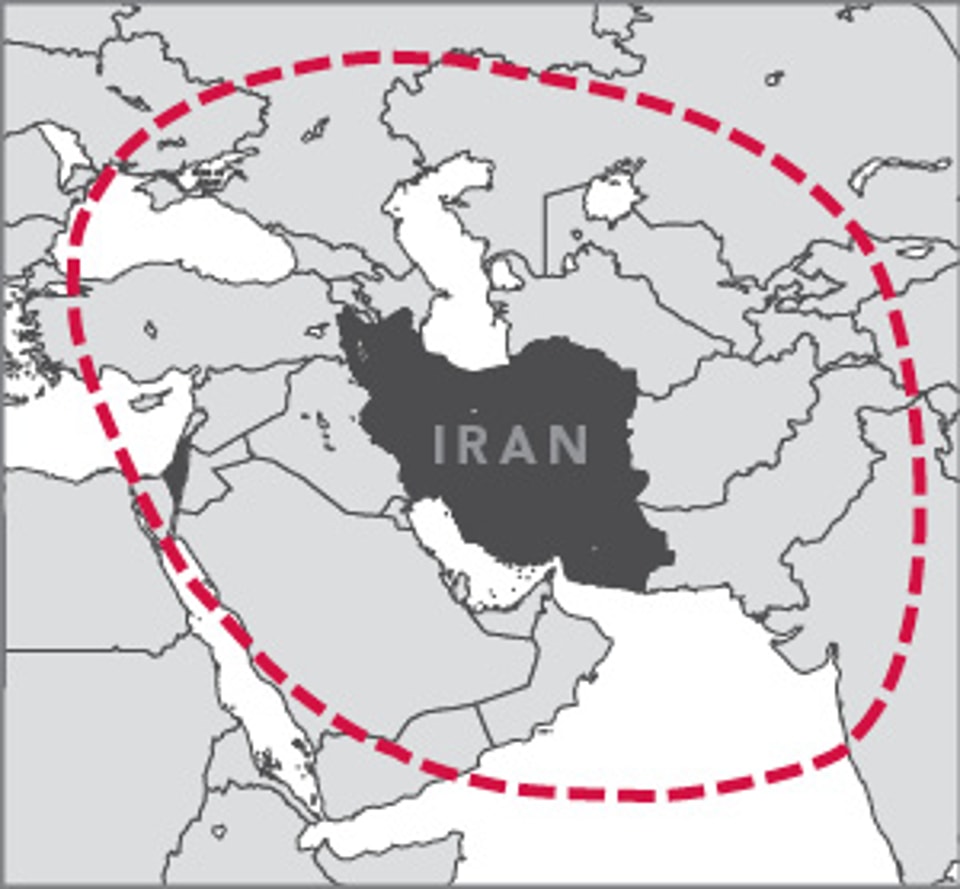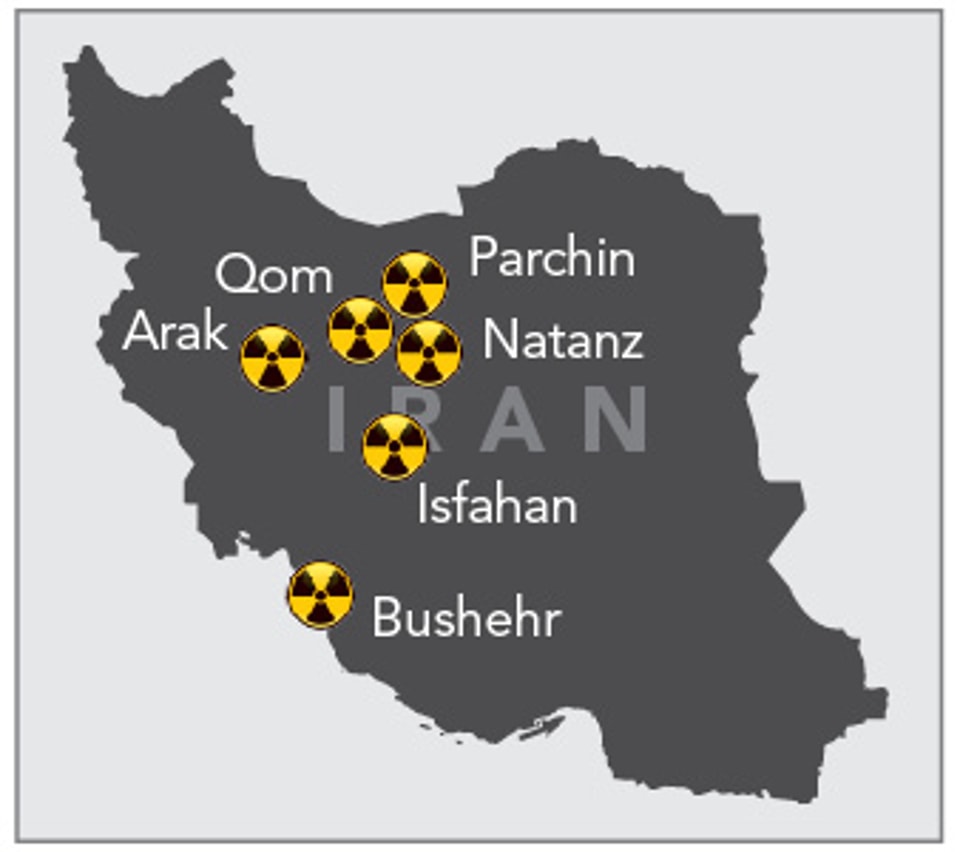Report Published January 2, 2013 · Updated January 2, 2013 · 10 minute read
Iran: Keeping Our Powder Dry
Mieke Eoyang, Lauren Oppenheimer, Robert Walther, & Aki Peritz
Takeaways
We offer three reasons why the use of force is not in the best interest of the United States or our allies in the near term:
- We still have time to stop Iran from obtaining a nuclear weapon;
- International diplomacy and crippling sanctions are working, but they need time to become fully effective;
- Striking too soon would make it harder to stop Iran in the long run.
A Nuclear-Armed Iran Is Unacceptable
America cannot accept a nuclear-armed Iran.
The U.S. cannot allow a designated state sponsor of terrorism to have a nuclear weapon. Iran has been a longtime supporter of terrorist organizations like Hezbollah and Hamas. These groups—bankrolled by Tehran—have attacked our embassies, murdered civilians, and taken hostages. Iran has also supported militant groups in Iraq and Afghanistan that have killed scores of U.S. troops over the past decade.
Shahab-3 Ballistic Missile Range1

A nuclear-armed Iran poses a grave risk to the stability and security of the most volatile region in the world. Iran has already threatened our vital allies by calling for their destruction and targeting their diplomats abroad. Iran would use its nuclear status to try to exert dominance over the region. This could ignite a nuclear arms race, as Saudi Arabia, Turkey, or others would begin the quest for nuclear weapons to even the score. Very quickly, the world could see multiple nuclear-armed nations in one of the most dangerous neighborhoods in the world.
A nuclear-armed Iran would undermine the global nuclear non-proliferation framework. Under the Nuclear Non-Proliferation Treaty (NPT), the number of states with nuclear weapons is limited in order to prevent the spread of these dangerous devices. Letting Iran develop and deploy nuclear weapons tells the rest of the world they too can ignore the NPT. Some nations will then think they too can seek the bomb without consequence or safeguards, increasing not only the risk of nuclear war, but also the possibility of a nuclear device falling into the hands of terrorists.
The United States and our allies simply cannot allow Iran, a designated state sponsor of terrorism, to build a nuclear weapon.
These are all unacceptable outcomes. But rejecting a nuclear-armed Iran does not mean embracing immediate military strikes.
Military Strikes are Premature
Now is not the time to exercise the military option. We offer three reasons:
1. We Still Have Time to Stop Iran.
Iran is gathering the ingredients, but it’s not certain that they’ve decided to bake this cake. Iran is clearly developing the components for a nuclear weapon. However, the U.S. intelligence community—after reviewing all of the available classified and unclassified data—does not yet believe Tehran has taken the ultimate step to build an actual bomb.2 As the Director of National Intelligence told Congress, “They are certainly moving on that path, but we don’t believe they have actually made the decision to go ahead with a nuclear weapon."3 [emphasis added]
Complicating the issue is that Iran signed the NPT. This treaty guarantees nations the right to develop, research, produce, and use nuclear energy for peaceful purposes, but it bars most countries from developing or acquiring nuclear weapons technology.4 While Iran has not been cooperating fully with the International Atomic Energy Agency (IAEA), which enforces the NPT, the IAEA has yet to find conclusive evidence that Iran has gone beyond peaceful uses.
If Iran gets the bomb, it will be impossible to tell other countries in the region that they cannot or should not build their own nuclear weapons.
Iran still has several challenges to overcome before they possess a viable nuclear weapon. There are still certain steps in the process that are difficult to hide and would provide unambiguous indications of Tehran’s intent to weaponize. These could include: enriching uranium to weapons-grade, expelling IAEA inspectors, withdrawing from the NPT, testing a device, and developing a delivery system.
Even if a country develops a nuclear weapons program, it can still be compelled to abandon it. For example, in 2003, Libya gave up its WMD programs and turned over all nuclear technology in order to normalize relations with the rest of the world.5 South Africa actually built nuclear weapons and then voluntarily gave them up.6
Most importantly, America, with the most powerful military in the world, has the ability to severely disrupt Iran’s nuclear program at any time. It would not be easy—Iran is large, and some of the sites are well-fortified. However, there’s no question that the U.S. military can get the job done. We have no arbitrary timeline, and there is no point when Iran’s program becomes too big to strike. There is no need to rush to war.
America has the power to disrupt Iran’s quest for nuclear weapons. We must choose the most effective way to do so.
2. Sanctions and Diplomacy are Biting.
The U.S. has built a web of sanctions and international agreements designed to make Iran’s quest for the bomb very painful. These are tough and unprecedented efforts, but they require time to work.
In 2010, President Obama signed into law the Comprehensive Iran Sanctions, Accountability, and Divestment Act (CISADA), which extended 1990s-era sanctions to punish companies that do business with Iran’s oil industry.7 But because implementation took a while, these sanctions have only had an effect on the Iranian economy since mid-2011. CISADA excludes foreign banks from doing business in the U.S. if they work with Iranian entities, thereby cutting off Iran from the international financial system.8
In early September, Israeli Prime Minister Benjamin Netanyahu said, “The fact is that every day that passes, Iran gets closer and closer to nuclear bombs."9 But Israel’s national security professionals and citizens remain divided on how to proceed.
In late August 2012, a former Chief of the Israel Defense Forces (IDF), Gabi Ashkenazi, called for a “combination of strategies” to combat Iran’s nuclear ambitions, including economic sanctions and covert efforts.10 He joined other knowledgeable Israelis—including ex-IDF Chief Amnon Lipkin-Shahak, ex-Mossad chief Meir Dagan, and ex-Military Intelligence head Aharon Farkash—who urge caution on confronting Iran with direct violence.11
Also, a June 2012 poll indicates a slim majority of Israelis (52%) oppose striking Iran militarily, stating Israel should pursue diplomatic options first.12 A November 2012 poll found that less than one in five Israelis (18%) favor striking Iran unilaterally.13
In addition, the U.S., the European Union (EU), and the UN have imposed various economic sanctions that are causing multiple challenges to Iran:
- In late 2011, President Obama signed into law tough new sanctions that specifically targeted both the Central Bank of Iran (CBI) and foreign institutions doing business with the CBI.14
- Since autumn 2011, the Iranian currency (the rial) has lost much of its value against the U.S. dollar.15 This economic stress has led to rampant inflation and increasing anxiety within the Iranian middle class.16
- The EU in January 2012 began placing an embargo on Iranian crude imports, as well as sanctions on the CBI, gold, certain dual-use technologies, and personalities connected to the Iranian Revolutionary Guard Corps (IRGC).17 On July 1, 2012 this embargo took full effect.18 Before the embargo, EU member countries purchased 20% of Iran’s oil exports.19
- Before the sanctions, Iran exported 2.5 million barrels per day. However, bilateral and multilateral sanctions have reduced Iranian exports to 1.25 million barrels per day—a 50% decrease.20 Despite sanctions, China, India, South Korea, Japan, and Turkey are the five largest remaining importers—but all have reduced the amounts they import.21
Sanctions and diplomacy are beginning to cripple Iran’s economy. They can bring the regime to heel, but they need time to work.

Diplomatic efforts against Iran are also beginning to have an effect. An international coalition, including countries not normally supportive of the American perspective, has coalesced to press for more inspections.
- In June 2010, the White House led an effort—with Russian and Chinese acquiescence—to push through a UN Security Council resolution restricting Iranian military, shipping, and financial capabilities, as well as banning nuclear-capable ballistic missiles technology.22 This effort built on previous sanctions, and played a factor in Russia’s decision to suspend all major weapons systems sales to Iran.23
- In early March 2012, the U.S., France, Germany, Great Britain, Russia, and China announced that they would restart negotiations with the Iranians over nuclear inspections and enrichment.24 These talks have yet to bear fruit, however.
- The U.S. is continuing to tighten the economic vise. In August 2012, the “Iran Threat Reduction and Syria Human Rights Act of 2012,” which makes even more business dealings with Iran “sanctionable offenses” became law.25
Only the Iranians can put a permanent end to their nuclear ambitions. We must convince them that the bomb is not in their interest.
As President Obama has said, “the only way historically that a country has ultimately decided not to get nuclear weapons without constant military intervention has been when they themselves take [nuclear weapons] off the table.”26 The use of force can destroy facilities and kill personnel, but the desire to relinquish the quest for nuclear weapons permanently lies within the Iranian government itself. Sanctions—and the economic and social disruption they bring—could provide exactly the kind of incentives they need to make this choice.
3. Premature Strikes Could Make It Harder to Stop Iran in the Long Run.
Military strikes could devastate the Iranian nuclear program, but they could never offer the assurance that Iran would not simply start over and try again. What’s more, premature strikes would make it much more difficult for the U.S. to deny them weapons in the future.
If we strike them too soon, we will lose the vital information we get from the international inspectors inside Iran, and we won’t ever be certain that their program is over.
Striking too soon could collapse the international consensus to stop Iran. Unless the U.S. provides clear evidence that Iran is weaponizing its nuclear program, it could be difficult to prod even normally supportive members of the international community to back an American strike. The U.S. would then struggle to hold together the coalition of nations that supports economic sanctions and technology transfer restrictions.
While many Middle Eastern governments normally hostile to Iran might quietly support the use of force,26 some may be obliged (due to domestic pressures) to publicly condemn it. This stands in sharp contrast to the 2011 airstrikes in Libya, where the Arab League openly sought NATO intervention.
After a strike, America would have less insight into Iran’s nuclear program. Once bombed, Iran would have little incentive to allow the IAEA or the international community to inspect its facilities.27 And the strikes would shatter the international consensus to compel Iran to accept inspectors.
The situation would be similar to Iraq after 1998, when the UN found that Iraq was not cooperating with weapons inspectors.28 Neither intelligence nor inspectors were able to satisfy concerns about the state of Iraq’s weapons program until the 2003 occupation.
Any time we consider military action... there’s going to be a price to pay.
— President Barack Obama, March 6, 2012
Conclusion
It is unacceptable for Iran to have a nuclear weapon. But while Tehran may be gathering the means to build a bomb, it’s not certain that they have decided to weaponize. In the meantime, we are squeezing Tehran through sanctions and diplomacy. They must be given time to work.
Ultimately, we can disrupt Iran’s nuclear ambitions at a timetable of our own choosing. The time may come when military action becomes our best option. But premature strikes would make it harder for us to stop Iran in the long run. For now, we should keep our powder dry.


